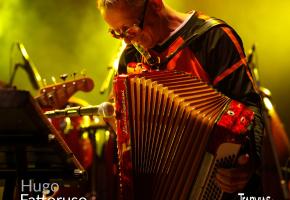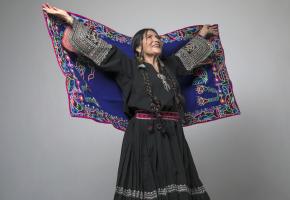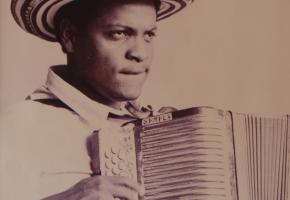A fado singer from Portugal is probably that last person you’d expect to see in the British tabloid press. But that’s what happens when Mick Jagger and Jose Mourinho come to your concert, as they did the last time Ana Moura performed in London in 2016; her name was splashed all over the Daily Mail. If Mick is coming to your concert you know you’ve hit the world of mainstream pop.
That, and oh playing alongside Prince who, apparently looked happier singing the great Amália Rodrigues’s spine-tingling "Vou dar de beber à dor" than he had during his re-run of hits at a festival in Portugal, when he invited Ana to play with him. Prince had found Ana’s music on the internet, travelled to Paris to see her and then invited her to Minneapolis.
The irony is that, for many years, fado was pretty much abandoned by a generation in Portugal, written off as sad music, music of the past. Indeed Ana Moura herself says: “I don't know why there was this idea of fado being sad or old people’s music.”
For Ana, fado was simply a way of growing up: “My parents were fado lovers and in my memories of childhood, my mother was always singing fado. My parents were very young when I was born, and I remember loads of friends coming to our house on weekends when I was child and the fado was always the soundtrack of those friends gathering.”
Perhaps because fado was so engrained in tradition that it got the perception of being old fashioned, in the same way that tango did for a while in Argentina. And, as Ana herself say, "you don't learn fado, you are born into it...but what is important,” she continues, “is that for a few years now a generation of new singers and musicians who are proving that fado is relevant. There are many young people writing a new fados.”
Indeed, fast forward to the winter season 2018/19 and you have three young fadistas - Mariza, Carminho and Ana Moura - selling out to large crowds in London, within the space of a few months. Few foreign artists fill a venue as big as the Roundhouse, and Ana Moura is one of them.
Of course, with the hype, comes the clumsy labels: The Guardian on various occasions repeating that fado is the “Portuguese answer to the blues,” which amuses Ana Moura as “musically they have nothing to do each other.” But she gracefully excuses the bizarre comparison (indeed why not say that blues is America’s answer to fado?) by adding that perhaps it refers to the fact that “in fado there is that lament and intensity that comes from the guts, from the soul, as in the blues.”
Another The New York Times declaration hailed Ana Moura ‘a fado modernizer’; Is this true? Ana laughs again.
“Perhaps I end up modernizing because of what I am listening to. Everything that I listen to ends up, unconsciously, influencing what I do.”
But in many ways Ana straddles both the traditional and innovative when it comes to her fado.
“Story telling is an important element of traditional fado, stories and the feelings provoked by the experiences of life. Of course, those feelings are the same in the present or the past, but the way we deal with them has changed a lot, especially from a female point of view. Women’s perspectives have changed; therefore, lyrics also change to give expression to this perception of feelings. As a woman, this is very important for me.”
Ana Moura is very conscious of her role in this process of invigorating fado, for example, by using new Instruments that are not present in the ‘fado ritual’, according to her. While, other fadistas favour traditional Portuguese guitar and acoustic bass, Ana prefers the electric bass and drum set that “that bring a language that is closer to jazz” and electronic keyboard, which explores and amplifies the sound of the portuguese guitar.
“This is my way of bringing modernity to fado,”she concludes, while insisting on also “singing the traditional fados that observe the classic structures and metrics of the Portuguese language, such as the quadras, quintilhas e sextilhas.”
Another way of keeping fado ‘modern’ is Ana’s use of young poets, such as Manuela de Freitas, Maria do Rosário Pedreita e José Eduardo Aqualusa, who write contemporary lyrics that have to do with the life experiences of her generation.
“Those partners are fundamental to my music.” She says. “They are poets that understand me, that know me and give me the feeling that I am passing on my message as best as I can. I can write music and I have some of my own compositions. But writing poetry? I don't have this skill. And we have a huge history of great poets in the Portuguese language. Therefore, I never dared to write poetry!” (laughs). “Meeting these partners has helped me put feeling and expression together.”
So from obscure poets, to spending the night in Prince’s hotel suite singing fados with his gospel backing-singers or recording and sharing a stage with The Stones, Ana seems to have touched gold when it comes to collaborations. Not to mention her performances with Brazilian legends Gilberto Gil and Caetano Veloso.
What have these collaborations brought to your fado? I ask.
“You learn so much collaborating with musicians from diverse traditions. But when it comes to Brazilian musicians, these guys were my musical idols; I grew up listening to Caetano Veloso, Gilberto Gil, Chico Buarque. So their influence was there before I met them, especially in my songs that are danceable, more humorous. This, perhaps, I got from the Brazilian music.”
I quote one of her fados, my favourite, O meu amor foi para o Brasil (My Love Went to Brazil) about a woman whose boyfriend left her pregnant in Portugal to go to Brazil, promising to be back soon. Once in Rio, he never contacts her again. The lyrics are full of irony, playing with the cultural differences between the two countries. Those stories of immigration from Portugal to Brazil were quite traditional and Ana Moura creates a wonderful modern update.
I ask about her plans for the future, after the great success of her last album from 2015, ‘Moura’. And reveals that she is pre-producing a new album, but “I cannot say exactly in which direction this album will go, I have several ideas, but I am still not in the process of creation. My intention is to continue discovering my path, to do something that makes sense in my history. I felt an enormous freedom when I recorded ‘Desfado’ (2012), getting out of my comfort zone and experiencing new things. I am feeling this necessity again. I am feeling the need to experiment with something that provokes my passion.”
And so, what can we expect from Ana Moura next Tuesday in London?
“I am preparing a concert that celebrates my previous albums, not only the last one, but with new arrangements…to present them in a new form.”
Ana Moura, always being traditional, always innovating.
Ana Moura will perform at the Roundouse next Tuedsya 22 January as part of 'In The Round' Tickets here


















